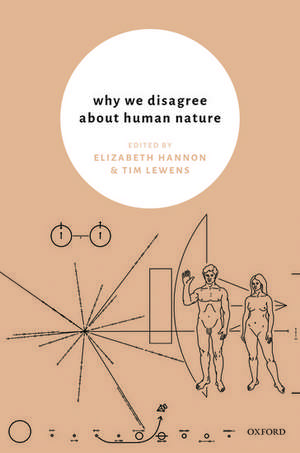Why We Disagree About Human Nature
Editat de Elizabeth Hannon, Tim Lewensen Limba Engleză Hardback – 5 iul 2018
Preț: 308.32 lei
Nou
Puncte Express: 462
Preț estimativ în valută:
59.00€ • 64.07$ • 49.56£
59.00€ • 64.07$ • 49.56£
Carte tipărită la comandă
Livrare economică 11-17 aprilie
Preluare comenzi: 021 569.72.76
Specificații
ISBN-13: 9780198823650
ISBN-10: 0198823657
Pagini: 228
Dimensiuni: 164 x 242 x 20 mm
Greutate: 0.52 kg
Editura: OUP OXFORD
Colecția OUP Oxford
Locul publicării:Oxford, United Kingdom
ISBN-10: 0198823657
Pagini: 228
Dimensiuni: 164 x 242 x 20 mm
Greutate: 0.52 kg
Editura: OUP OXFORD
Colecția OUP Oxford
Locul publicării:Oxford, United Kingdom
Recenzii
a terrific volume, , that brings an interdisciplinary range of leading thinkers offering arguments and reflections on the concept of human nature that amount to a state-of-the-art report on what roles it can, and cannot, play. . . . While no book can be the last word on a subject like this, this book gives the latest word, and it should be among the first things to read for those who will carry the discussion forward from here.
The strength of this collection is the varied expertise of the authors, all of whom are well established in their respective fields, including the philosophy of science, evolutionary studies, anthropology, and psychology. Each author presents a compelling case and gives the reader a clear framework for their specific perspective ... Recommended.
This is a 'must read' for everybody interested in human nature and how we can better understand it.
The strength of this collection is the varied expertise of the authors, all of whom are well established in their respective fields, including the philosophy of science, evolutionary studies, anthropology, and psychology. Each author presents a compelling case and gives the reader a clear framework for their specific perspective ... Recommended.
This is a 'must read' for everybody interested in human nature and how we can better understand it.
Notă biografică
Elizabeth Hannon is Director of the Forum, LSE, and the Assistant Editor for the British Journal for the Philosophy of Science. She has taught in Durham University, the University of Leeds, and the University of Cambridge. Her primary research interests lie within the philosophy of biology and she also edits the popular philosophy essay series, theEssays.Tim Lewens is a Professor of Philosophy of Science in the Department of History and Philosophy of Science, University of Cambridge, and a Fellow of Clare College. From 2014 to 2017 he was Deputy Director of the Centre for Research in Arts, Social Sciences and Humanities, University of Cambridge. His primary research interests include the philosophy of biology, biomedical ethics, and general philosophy of science. His publications include Darwin (Routledge 2007), Biological Foundations of Bioethics (OUP 2015), Cultural Evolution: Conceptual Challenges (OUP 2015), and The Meaning of Science (Penguin 2015). He was a member of the Nuffield Council on Bioethics from 2009 to 2015.
